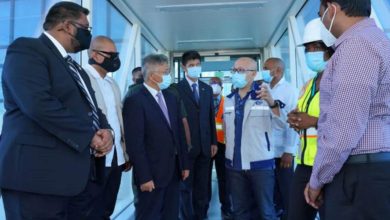Williams queries 60-day shelter limit for Caribbean migrants

As New York City nears the arrival of 100,000 asylum seekers since last spring, New York City Public Advocate Jumaane D. Williams has questioned the Eric Adams administration’s new 60-day shelter stay limit for adult Caribbean and other migrants and refugees.
Many of the asylum seekers are nationals of Cuba, Haiti and Venezuela.
During a City Council Oversight hearing on Thursday, Williams, the son of Grenadian immigrants, highlighted the need to uphold the right to shelter amid the refugee crisis.
Williams also called for increased state and federal resources to support the asylum seekers.
“I recognize that the city was already in a preexisting housing crisis with a shelter system unequipped to accommodate over 100,000 people,” said Public Advocate Williams. “At the same time, these living conditions are unacceptable, and the mayor’s continued efforts to undermine the right to shelter, most recently illustrated in his 60-day limit on shelter stays, will not address the root of the problem.”
In 2022, Williams said the average length of stay in a shelter for single adults was 509 days, stating that New York City needs help from the state and federal governments, as well as from neighboring communities—”not to weaken a crucial safety net for some of our most vulnerable.”
The Public Advocate recently visited the Roosevelt Hotel as refugees were forced to sleep outside.
Earlier this month, he traveled to Washington to “advocate for a series of federal actions to alleviate the mounting humanitarian crisis.”
Williams has continued to stress the importance of meeting the needs of the newest New Yorkers, “rather than stepping away from our moral and legal obligations, while acknowledging the challenges of the moment and the need for all levels of government to provide aid.”
“New York City cannot handle this crisis alone. We need assistance from the state and federal governments,” he said in Thursday’s hearing, listing several policy requests.
“The right to shelter has been in place for over 40 years, and that right does not simply expire after 60 days in the face of a crisis,” he said. “While the challenges of meeting this emergency are immense, so too is our obligation to do all we can for the tired, the poor, the huddled masses.
“We should be focused on helping create opportunities for people who come here seeking asylum, not preemptively deny that our city is home to opportunity itself,” he added.
On Thursday, Adams laid out updated figures the asylum seeker crisis will cost the city over the next two fiscal years, if swift action is not taken by the state and federal governments to further help manage this emergency.
The mayor said New York City has already spent US$1.45 billion in Fiscal Year (FY) 2023 to provide shelter, food and services to tens of thousands of asylum seekers, but — as the city nears a total of 100,000 asylum seekers arriving since spring of 2022 — without further support, new cost estimates, based on current trends, show that the city has the potential to spend upwards of US$12 billion over three fiscal years (FY23, FY24, and FY25) without policy changes.
“Immigration is the New York story. It is the American story. But, as I declared nearly a year ago, we are facing an unprecedented state of emergency due to the asylum seeker crisis,” said Mayor Adams. “Since last year, nearly 100,000 asylum seekers have arrived in our city asking for shelter, and we are past our breaking point.
“New York City has been left to pick up the pieces of a broken immigration system — one that is projected to cost our city US$12 billion over the course of three fiscal years, without policy changes and further support from the state and federal governments,” he added. “Our compassion may be limitless, but our resources are not.
“This is the budgetary reality we are facing if we don’t get the additional support we need,” Adams warned. “Without immediate assistance from our state and federal partners, we will continue to see heartbreaking scenes like the one outside The Roosevelt last week.”
He said while New Yorkers did not create the international humanitarian crisis, New York City residents “have been left to deal with this crisis almost entirely on our own.
“Our city will remain a beacon for all who come to our shores, because that is the New York City way; it is time for that to be the American way as well,” the mayor continued.




